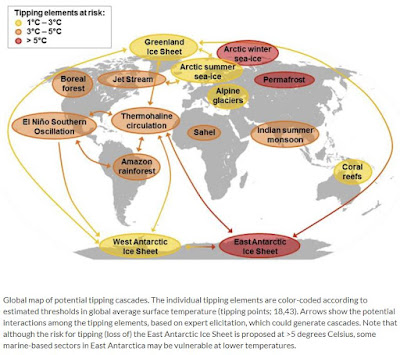It’s too late to stop severe climate change – indeed we see it around us. But it is absolutely not too late to slow the rate of climate change. ... We can, and must, still act.Update (August 4): Jem Bendell also continues to see a need for action in what he calls the Deep Adaptation Agenda.
Disruptive impacts from climate change are now inevitable. Geoengineering is likely to be ineffective or counter-productive. Therefore, the mainstream climate policy community now recognises the need to work much more on adaptation to the effects of climate change. That must now rapidly permeate the broader field of people engaged in sustainable development as practitioners, researchers and educators. In assessing how our approaches could evolve, we need to appreciate what kind of adaptation is possible. Recent research suggests that human societies will experience disruptions to their basic functioning within less than ten years due to climate stress. Such disruptions include increased levels of malnutrition, starvation, disease, civil conflict and war – and will not avoid affluent nations.Update (August 7): A study published in Proceedings of the National Academy of Sciences finds that even meeting the emissions reductions in the Paris Agreement still risks failing to hold warming to 2 degrees Celsius. Even that increase could trigger positive feedbacks.
A “Hothouse Earth” climate will in the long term stabilize at a global average of 4-5°C higher than pre-industrial temperatures with sea level 10-60 m higher than today.
Update (August 14): Manuel Garcia notices more headlines about forest fires.
Why this new overt and blaring mainstream news attention to climate change, a subject that was officially hush-hush, trivial and fake news so recently in the past? Obviously because climate change has begun costing big money to major sectors of American capitalism.Update (August 20): In an interview with Chris Hedges, Adam Frank also warns of a coming hothouse.
Once you get the ball rolling down the hill. … This is the greatest fear. This is why we don’t want to go past 2 degrees [Celsius] of climate change. We’re scared that once you get past 2 degrees, the planet’s own internal mechanisms kick in. The population comes down like a stone. A complete collapse. You lose the civilization entirely.Also, a report called What Lies Beneath: The Understatement of Existential Climate Risk seems self explanatory. It highlights a quote by Robert Corell from 2007:
We are climbing rapidly out of mankind's safe zone into new territory, and we have no idea if we can live in it.Update (August 22): Robert Hunziker offers a quote from the PNAS study hinting that capitalism is incapable of solving the problem.
The present dominant socioeconomic system, however, is based on high-carbon economic growth and exploitative resource use. ... Incremental linear changes to the present socioeconomic system are not enough to stabilize the Earth System. Widespread, rapid, and fundamental transformations will likely be required to reduce the risk of crossing the threshold and locking in the Hothouse Earth pathway… We suggest that a deep transformation based on a fundamental reorientation of human values, equity, behavior, institutions, economies, and technologies is required.Update (September 3): In his book, Light of the Stars, Adam Frank explains his reasoning for assuming technological civilizations have previously existed in the universe. He also presents the results of preliminary modeling for those civilizations encountering their own versions of climate change. The most frequent result was a massive dieoff before stabilization. Adaptation seems more manageable with a greatly reduced population, but what kind of civilization would be left isn't clear. A second result was stabilization after early adoption of low-impact energy technology. The last result was extinction even after later adoption of low-impact technology. Extinction may depend on things like climate sensitivity to new forcings. Of course, all the associated probabilities are unknown.
And a paper published in Science expects changes as large as those during the last glacial-to-interglacial transition.
[W]ithout major reductions in greenhouse gas emissions to the atmosphere, terrestrial ecosystems worldwide are at risk of major transformation, with accompanying disruption of ecosystem services and impacts on biodiversity.Update (January 26, 2019): Robert Hunziker discusses a video from Jem Bendell.
Update (December 22, 2021): Marianne Apostolides argues Bendell undervalues new technology that could avoid the collapse of civilization.
[His] logical leap from catastrophic climate change to societal collapse betrays his stance against capitalism, which he has blamed for the climate crisis. Bendell denigrates mainstream adaptation efforts as "encouraging people to try harder to be nicer and better rather than coming together in solidarity to either undermine or overthrow a system that demands we participate in environmental degradation." By implication, those efforts — the unglamorous work of revamping infrastructure, engaging in urban and ecosystem planning, coordinating supply chains for food, water, and raw materials — are superficial, unlike the profound ethical and spiritual transformation that Deep Adaptation envisions. Societal collapse, in this worldview, becomes the event that triggers a creative reimaging of human civilization.
Blinded by utopian visions, Bendell seems to overlook the advancements, in science and technology and other realms, that are capable of upholding society. In sectors such as energy, water, materials science, and agriculture, basic science and innovative technology are spawning new realities that could stabilize societies, even amid horrific shifts in the natural world. Some of this technology, including large-scale nuclear fusion reactors and smaller nuclear batteries, will reduce carbon emissions. Other technologies, especially those developed with synthetic biology, may help us adapt to a warming planet by, for example, improving crop yields and revolutionizing manufacturing. By seizing a power once reserved for nature — the power to direct evolution — scientists can tackle some of the very problems humans have created through their consumption of fossil fuels.
None of these developments is a panacea. None will stop catastrophic climate change. None prefigure a world I want to live in. Yet they all refute the idea of societal collapse.

No comments:
Post a Comment
Note: Only a member of this blog may post a comment.